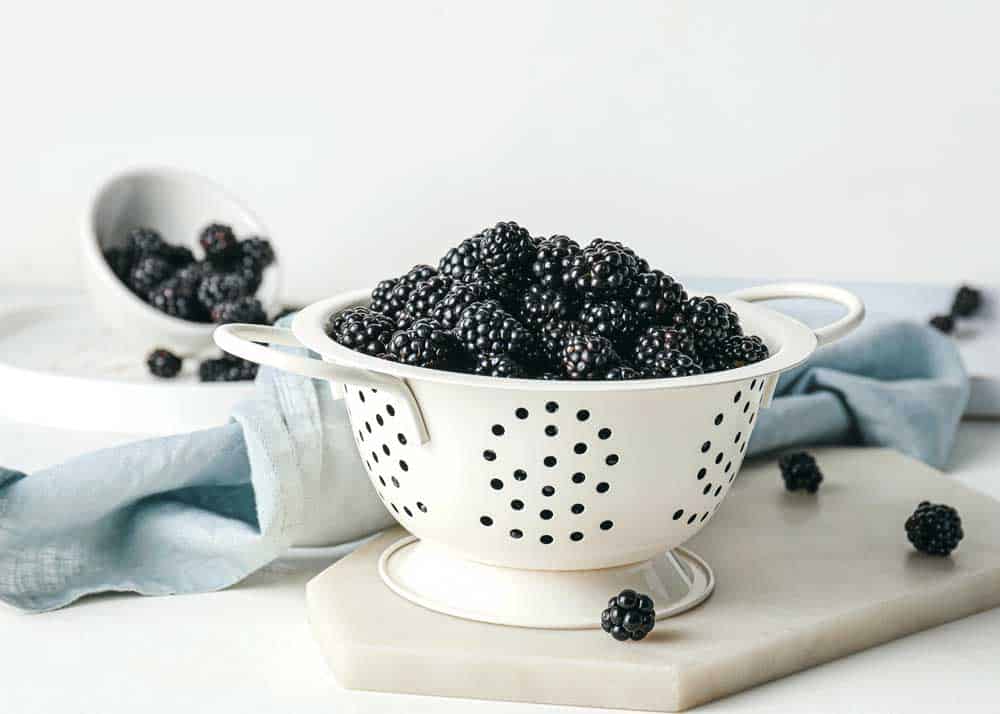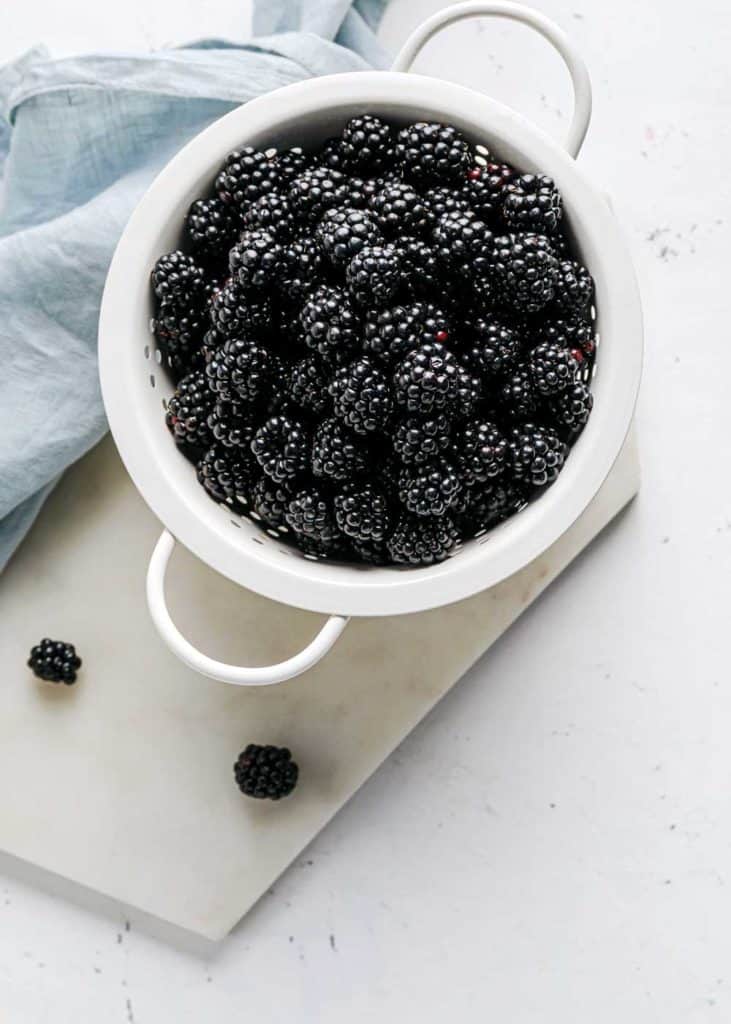Bringing home fresh blackberries from the market is a real treat. They can be used in a variety of recipes, or as a tasty snack straight from the container! But, before you start eating them, it’s important to know how to wash blackberries the right way.
The most obvious choice is to run the blackberries under cool water, right? Unfortunately, that isn’t always the best answer. Blackberries are quite delicate, and although they have tough skin, rinsing with cold water could bruise them. If you want to use water on its own to clean your berries, consider submerging them in a large bowl of it, rather than rinsing them for several minutes.

So, while running under cold water (gently) is an option, there are other ways to wash fresh berries that can help them last longer in your refrigerator. Let’s cover a few helpful methods so you can start snacking safely.
Table of Contents
3 Ways to Wash Blackberries
1. Colander Swishing
Because of their delicate nature, blackberries need to be handled differently than strawberries.
Here’s what Better Homes & Gardens recommends for delicate berries, including blackberries.
For blackberries, raspberries, boysenberries, and blueberries, do not rinse under running water because the pressure can crush them. Instead, place the berries in a colander and dip them in a bowl of cold water. Gently swish the colander in the water, then allow the berries to drain.
BHG.com
Here is a great option for a stainless steel or plastic colander.
Note: For these next two methods, you’ll probably want to do a final freshwater rinse, so that the vinegar and salt don’t alter the flavor of the berries.
2. Apple Cider Vinegar
Apple cider vinegar (or regular distilled vinegar) is a great natural cleaning agent, especially when it comes to getting rid of pesky bacteria and possible bugs that won’t be easily removed by a simple rinse.
When washing your blackberries with apple cider vinegar, it helps to create a solution of water and vinegar in the sink or a large bowl.
This will remove any pests and dirt from the berries without diminishing their flavor.
Berry Mix: One part vinegar and three parts water are ideal here, as the vinegar is more diluted and less likely to overpower the blackberries.
It’s important to note that you should only leave the blackberries to soak in the solution for no more than ten minutes. After the ten-minute mark, the berries may start to get soggy. And pickled.
Afterward, it helps to rinse the berries off with clean water and pat them dry with a paper towel.
This will help in storing them in your refrigerator, as they can spoil quite easily if they’re left exposed or only protected by the plastic container they came in.
Wrapping them in a paper towel can help to keep them in a dry environment that will slow down the “rotting” process.
3. Saltwater
Another great way to clean blackberries is to use salt water. Saltwater is known to extract bugs from berries that may be lingering inside the fruit. No one wants to think about critters in their berries, but it happens!
If you soak berries in saltwater for about half an hour, you may witness tiny bugs and maggots surface in the water. This is due to the saltwater not only drawing out live bugs but also making eggs laid in the fruit hatch at a faster pace for the offspring to make their escape from the fruit.
It’s not an appealing thought, but it’s better than eating those insects!
The small white bugs are likely maggots of the spotted wing Drosophila (SWD). The female lays her eggs in the fruit just as it ripens.
After using a saltwater soak, it helps to rinse the berries off with clean water again to get the salty taste off of them and restore their natural flavor.
Again, it is important to dry them off with paper towels and store them in your refrigerator to preserve them longer.
Why Should Blackberries Be Washed?
There are a few reasons to wash your berries before eating.
- Bacteria from the soil, bugs, or birds in the fields
- Pesticides. Some pesticides are water-soluble and can be removed by washing.
- Human contamination: Whether you hand picked them or bought them at a market, someone had to handle your blackberries before making it to your kitchen.
- Bugs: This is the one that seems the most gross, because no one wants to see a maggot on their fresh berry.
Freezing Blackberries
If you’re looking to preserve your berries for a longer amount of time than just a few days in the fridge, it may be a good idea for you to freeze them.
This will protect the berries so that they won’t spoil too fast, and you can use them continuously until they either run out or eventually go bad.
When to Wash Blackberries for Freezing
But, should you wash your blackberries before freezing or after?
The cleaning methods remain the same if you want to freeze your blackberries, and it should be done before they’re frozen.
However, it’s incredibly important to make sure they’re dry before storing them in the freezer. Rinsing them off and popping them into a plastic bag to freeze will create a lot of ice crystals and may lessen the quality of your berries.
More reading: How Long Do Blackberries Last? Fridge, Counter, Freezer

Keep Learning: Can You Microwave Cardboard? 13 Things to Know
Should You Wash Blackberries?
As you can see, there are several different ways you can choose to clean your blackberries. Whether you picked them yourself, got them at a market, or bought them from your local grocer, you never know what could be lurking inside the fresh fruit.
Even if all you can do is a quick rinse under a gentle faucet, it’s always best to wash them before consuming or using them in your favorite recipes. You may not always find bugs or other pests, a quick rinse will get rid of a lot of excess dirt and potential pesticides and chemicals that were used in the growing process.
- About the Author
- Latest Posts
Dena Haines is a co-founder and blogger on Tasty Plate – and is working to make it the best food blog in the world.
Dena also blogs about coffee at Enjoy Java and travel at Storyteller.Travel
Dena is a partner at Storyteller Media, a publishing company she started with her husband, Bryan.
